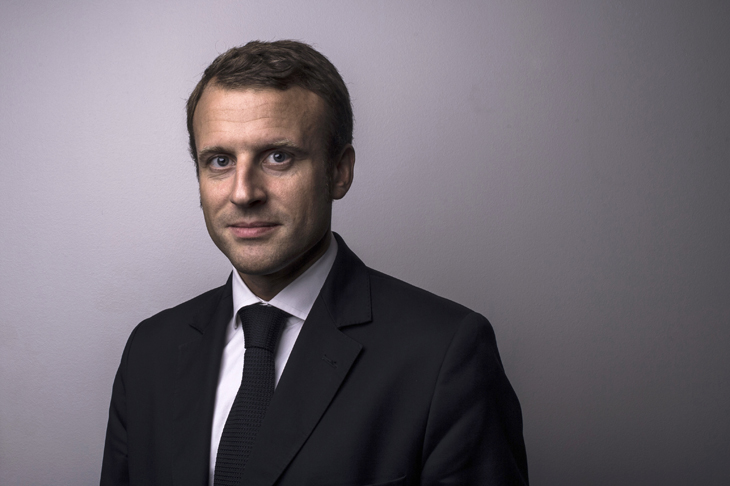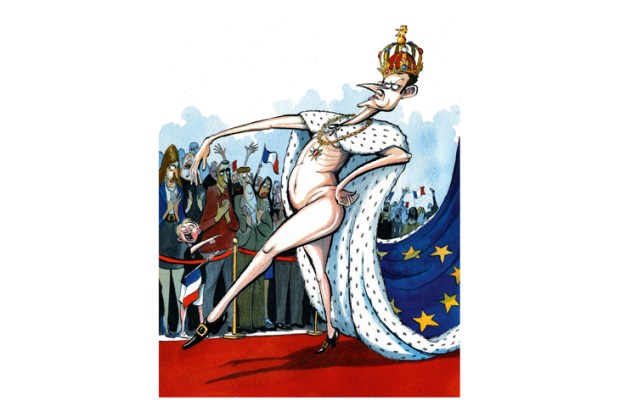Paris
While Theresa May flounders in a mess of her own making, Emmanuel Macron is striding out on to the sunlit uplands of French politics. Six decades after Charles de Gaulle set up the Fifth Republic, his seventh successor is charging ahead with his attempt to restore a quasi-monarchical authority to the occupant of the Elysée Palace. After three hollow presidencies, the 39-year-old hope of the European reformist centre is bent on turning the clock back in terms of presidential power with a broad-based electoral appeal, positioning himself above the sclerotic political world that has alienated most voters and blocked structural change in France since the 1980s. This has involved an audacious gamble that carried him to the presidency last month and has now set him on course for a crushing majority after the second round of the National Assembly elections this weekend.
His new party, La République En Marche (REM), with its array of untried candidates, is heading for an overall majority of anywhere from 350 to 450 of the 577 seats, according to pollsters. Party managers now say they are worried that too many untried deputies will flock into the Palais Bourbon with excessive expectations of change.
What a contrast to the mainstream centre-right Republicans, predicted to win 85-125 seats, the humbled Socialists with 20-35, the hard-left La France Insoumise (The Unbowed) with 11-21 and the National Front with as few as three to ten.
A mixture of the presidential attraction factor and public disdain for the established parties has given a huge boost to the young contender, and he has been brilliant at making the most of every opportunity presented to him. So Macron should be in a strong position to push through his programme to reform the labour laws, cut corporate taxes and start reducing the state deficit. A law to ‘moralise’ politics will be hard to oppose after the scandal that hit the ill–fated François Fillon, the centre-right presidential runner for the Republicans, though it also poses a problem for the new president, since one of his closest associates, Richard Ferrand, is under a cloud because of revelations about ‘sweetheart’ deals done with his partner by a housing association he headed.
But there are three more substantial grains of sand in the Macronite oyster. The first is that the voter abstention rate in the National Assembly first round reached a record 51 per cent, reflecting voter boredom after an endless succession of primaries and elections. This hit the National Front and La France Insoumise hardest — the Front won just 3 million votes compared to 7.7 million for Marine Le Pen in the presidential ballot, while on the other side of the political spectrum Jean-Luc Mélenchon’s movement slumped from 7 million to 2.5 million. In contrast, only 38 per cent of Macron’s original voters stayed away last Sunday. His opponents are hoping to galvanise supporters this weekend, but the logic of returning a parliament that reflects the president remains strong. Still, the low turnout will prompt wailing from anti-Macronites that he enjoys overweening powers on the vote of less than half the electorate.
Secondly, if the forecasts are correct (and French polls have been pretty accurate) the skewed nature of the likely outcome will be another cause for complaint. Taken together, the Socialists, the National Front and La France Insoumise got more votes last Sunday than REM, but Macron’s party is on course to win ten times as many seats. Fairness would point to proportional representation, but this would open the door to an unruly legislature.
Thirdly, the potential for extra-parliamentary action remains high, given the small representation likely for opponents from the hard left and right. Macron can take some comfort from the fact that the more reasonable trade union federation, the CFDT, has outstripped the more militant CGT in numbers — but the Communist-led group showed it still has the power to cause trouble with mass demonstrations against the Hollande administration’s more timid changes to the labour laws.
How well Macron resists extremist attempts to stir things up will be the key to his presidency. If he retreats, as Nicolas Sarkozy did, France will be back to the old treadmill. If he stands firm, backed by his majority in parliament, the door will be open to the kind of change France has needed for decades.
The aim is to make the nation a more efficient competitor in a cut-throat world while retaining enough of the lures that make it the globe’s leading foreign tourist destination. In the process, the political system would go through a process not seen since the early years of the Fifth Republic. The Gallic Humpty Dumpty is no more — barring a stunning reverse in Sunday’s second round of voting, the old political egg has finally crashed off the wall in the latest stroke of good fortune to accompany Macron’s rise to the summit.
The shell is scattered far and wide whichever way you look. The Socialists have split into three competing factions, have lost their heartland in the north and have seen their leaders eliminated one by one. On the Republicans’ side, prominent centre-right figures agreed to be prime minister and economics minister in the pre-election government, while others are at sixes and sevens about how to deal with the Macron surge, fearing that cooperation may lead to him gobbling them up. Left-winger Mélenchon has become a self-anointed prophet wandering in the wilderness and spewing invective against everybody else. Marine Le Pen has to bear the burden of her terrible campaign for the second round of the presidential election, along with National Front splits that have seen her main lieutenant under concerted internal attack and her charismatic niece staging a withdrawal from politics to care for her two-year-old child — no doubt awaiting a call to return as the party’s Joan of Arc.
To compare Macron’s elevation with de Gaulle’s return in 1958 may seem ridiculous. The new boy lacks the General’s historic stature (not to mention his height) and is nearly 30 years younger than his predecessor was at the time. In the place of the wartime leader of the Free French who then plunged into domestic political battles is a man who has just fought his first-ever election, the embodiment of technocratic modernity compared to the old soldier with his romantic attachment to the country ‘of which I have a certain idea’. While de Gaulle was a past master at aloofness and had no time for small talk, Macron is a charmer who stays on after dinner parties to shoot the breeze.
It is also hard to imagine the ultra-conservative Madame de Gaulle — ‘Tante Yvonne’, who hoped her husband would ban miniskirts — feeling at home with Brigitte Macron, 24 years her husband’s senior and described by the Financial Times fashion editor Jo Ellison as a ‘smoking-hot 60–something woman with a killer smile’.
But the parallels are there, all the same. One man tilting against a political system that many people think has lost its way, a discredited political establishment, a challenge from the far right, and violent attacks from extremists. A rush of hope in place of pervasive morosité, falling national confidence, flagging trust in institutions, entrenched vested interests on left and right and a loss of economic competitiveness with the partner/rival across the Rhine. A confident leader with a fine sense of the theatre of politics who knows how to grasp the opportunities presented to him and manipulate the ambitions of the old order to his advantage while striking out on the world stage in a way the French relish — one who, beneath his promise to change everything, embodies many of the beliefs of the establishment he professes to repudiate.
Searches for l’homme providentiel usually end in disappointment when the man on the white horse turns out to be all too human. But the long and deep nature of the travails that have shrouded France since the inevitable failure of François Mitterrand’s attempt to chart a leftward path in the early 1980s may have created the context for a change in the national mindset akin to the one that brought the end of the Fourth Republic.
It is still early days, of course, but after all those wasted years, France may be in with a better chance of making more of itself.
Got something to add? Join the discussion and comment below.
Get 10 issues for just $10
Subscribe to The Spectator Australia today for the next 10 magazine issues, plus full online access, for just $10.
You might disagree with half of it, but you’ll enjoy reading all of it. Try your first month for free, then just $2 a week for the remainder of your first year.














Comments
Don't miss out
Join the conversation with other Spectator Australia readers. Subscribe to leave a comment.
SUBSCRIBEAlready a subscriber? Log in